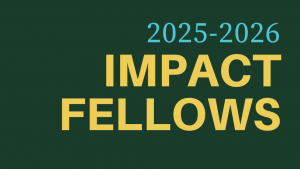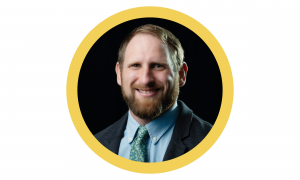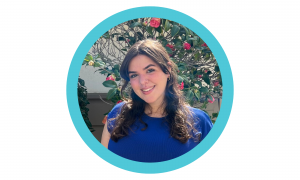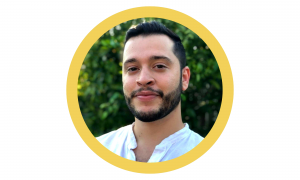
Children and Screens is thrilled to welcome its second cohort of Impact Fellows, a group of six outstanding graduate students selected for their passion, expertise, and commitment to helping young people lead healthy lives in a digital world.
Over the course of the 2025-2026 program, these Fellows will collaborate with Children and Screens’ dedicated team to advance cutting-edge research, support public education initiatives, and inform policies that promote the health and well-being of young people.
“We are proud to welcome our second cohort of Impact Fellows,” said Kris Perry, Executive Director of Children and Screens: Institute of Digital Media and Child Development. “These impressive scholars represent the future of the field, and their contributions will be instrumental in shaping how we understand and respond to the challenges and opportunities of growing up in a digital age.”
As active contributors to the Institute’s core programs, Fellows will help plan and execute the Webby-nominated Ask the Experts webinar series, synthesize and share relevant scientific literature, analyze digital media-related policy and legislation, and develop accessible content to inform and engage the public.
These 2025-2026 Impact Fellows were selected from a large and highly competitive pool of applicants. We look forward to the expertise, creativity, and fresh perspectives they will bring to our mission.
The 2025-2026 Impact Fellows
 Vanessa Cirolini Lucchese (Graduate Student, Psychology), Simon Fraser University
Vanessa Cirolini Lucchese (Graduate Student, Psychology), Simon Fraser University
Vanessa is a graduate student in Psychology at Simon Fraser University, specializing in Developmental Psychology and working under the supervision of Dr. Peplak in the Grow to Care Lab. Her research interests include children’s and adolescents’ moral-emotional development and its associations with their use of digital media. She is also interested in how parents talk with their children about screen use and online platforms. A central focus of her research is expanding our understanding of how digital media, especially social media, shapes development and how parents prepare children for the digital world. Vanessa is originally from Brazil, where she completed her BA in Psychology and Master’s in Health Psychology. In her free time, Vanessa enjoys reading, cooking, watching movies, and spending time with family and friends.
 Gregory Chase (PhD Candidate, Clinical Psychology), University of North Carolina at Greensboro
Gregory Chase (PhD Candidate, Clinical Psychology), University of North Carolina at Greensboro
Greg Chase is a Clinical Psychology Ph.D. candidate in the Interactions and Relationships Lab at the University of North Carolina at Greensboro. His research examines the roles of parents, peers, and broader social networks in youth externalizing and substance use, with an emphasis on digital communication and social media use. Clinically, he specializes in gender-affirming care of children and adolescents with a particular focus on chronic illnesses and substance misuse. Greg received his Bachelor of Arts in Psychology from Arizona State University and Master of Arts from the University of North Carolina at Greensboro. In his free time, Greg enjoys spending time outdoors, cooking with friends, and hanging out with his godkids.
 Paul Hunhoff (PhD Candidate, Educational Psychology), Oklahoma State University
Paul Hunhoff (PhD Candidate, Educational Psychology), Oklahoma State University
Paul Hunhoff is a Ph.D. candidate in the Educational Psychology program at Oklahoma State University and a member of the Communication Technologies & Youth Development Research Lab. His research focuses on young people’s social media engagement, and its impact on psychosocial well-being. His interdisciplinary work explores digital social multitasking, adolescent mental health, and the psychological effects of social media use. He holds a Master of Arts in Educational Psychology and a Bachelor of Science in Secondary Social Studies Education from the University of New Mexico. In addition to his research, he has extensive teaching experience as a Graduate Teaching Associate and Adjunct Instructor at Oklahoma State University, where he has led undergraduate courses on adolescent psychology and learning motivation. In his free time, he enjoys exploring new places, embracing adventure, and staying active outdoors.
 Samantha Jones (PhD Candidate, Social, Personality, and Developmental Psychology), Western University
Samantha Jones (PhD Candidate, Social, Personality, and Developmental Psychology), Western University
Samantha Jones is a Ph.D. candidate in Social, Personality, and Developmental Psychology at Western University. Her doctoral research investigates how people regulate their emotions when engaging with algorithmically generated social media feeds. Her work aims to support the development of healthier digital environments and to improve users’ well-being online. She received her B.Sc. (Honours) from Queen’s University where she majored in Psychology and completed a minor in Biology. Outside of her academic pursuits, Samantha enjoys yoga, crafting, and exploring local wildlife.
 Hechmi Kilani (PhD Student, Developmental, Cognitive, and Behavioral Neuroscience), University of Houston
Hechmi Kilani (PhD Student, Developmental, Cognitive, and Behavioral Neuroscience), University of Houston
Hechmi Kilani received his B.A. in Psychology from the University of Houston and is now a Ph.D. student in the Developmental, Cognitive, and Behavioral Neuroscience program at the University of Houston. He is interested in the effects of digital media and technology on child development, particularly in the early stages of development. His ongoing thesis focuses on pre-kindergarten education, tablet use, assessment, and child experience with an emphasis on affect, behavior, and social interactions. His broader dissertation explores similar dimensions in culturally diverse populations, such as English-speaking Saudi Children and Arabic-speaking children in both the U.S. and Saudi Arabia. At the core of his research is the Bilingual English Language Learner Assessment (BELLA) application, a tablet-based kindergarten readiness assessment designed as a research tool. Hechmi is interested in bridging the gap between the scientific community and the public and is passionate about approaching child development through a cultural lens. Regarding technology, he believes that innovations are here to stay, and it is of the utmost importance to approach them from a neutral point of view to understand both the benefits and drawbacks, as well as how to maximize them, particularly for pre-adolescent children.
 Allison Langer (PhD Candidate, Developmental Psychology), Temple University
Allison Langer (PhD Candidate, Developmental Psychology), Temple University
Allison Langer is a Ph.D. candidate in Developmental Psychology at Temple University, specializing in quantitative methods and developmental psychopathology. Her research focuses on child-technology interactions, including how children perceive content generated by artificial intelligence (AI), how they learn with educational robots, and how early screen media use influences cognitive development. Allison earned a bachelor’s degree in the Biological Basis of Behavior from the University of Pennsylvania, where she developed a passion for translating research into policy through coursework at the Center for Neuroscience and Society. In her free time, she enjoys baking for family and friends, going on hikes, and spending time with her cat, Frankie.